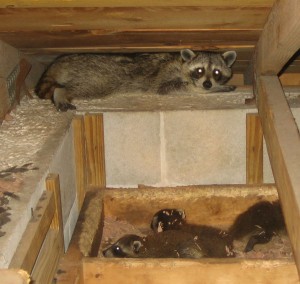Raccoon Roundworm
 When we were doing a little research about raccoon roundworms, we already knew that it was very dangerous for humans to ingest roundworms from raccoons. But we were a little shocked at what we found. Now we understand why being careful when dealing with raccoons is so important. You must avoid any possibility of ingesting the eggs of the roundworm.
When we were doing a little research about raccoon roundworms, we already knew that it was very dangerous for humans to ingest roundworms from raccoons. But we were a little shocked at what we found. Now we understand why being careful when dealing with raccoons is so important. You must avoid any possibility of ingesting the eggs of the roundworm.
The official title is Baylisascaris. However, we will just use the term raccoon roundworm in this post. Raccoons who are infected shed millions of eggs daily. The eggs take two weeks to turn into larvae and can remain viable for many years. They can withstand harsh weather and decontamination. They can easily withstand the heat and cold in your attic without any problem. Once they enter the host, ie, a raccoon or worse, a human, they like to head to the brain. Also, the eyes with apparent impacts.
How Do Humans Contract Raccoon Roundworm
The eggs are in the feces, which can be found just about anywhere. However, if you have raccoons in your attic, this means the feces will be on your roof. They will be in your eaves trough, and they will be in your attic as well. Raccoon feces can be found almost anywhere in the wild. Certainly around the outdoors of your home if you have raccoons in your attic. Anywhere there is food left outdoors, under shrubs and along fences, there will be raccoons and feces from the raccoons. We have a fence at the back of our yard. My neighbor on the other side of the fence calls it the raccoon highway!
By far, the greatest people at risk are young children playing outside and may come in contact with raccoon feces. They may not be aware that they have been in contact. We know that young children do not always wash their hands as often as they should and also tend to lick their fingers etc.
Raccoon Roundworm in Your Attic
If you have raccoons in your attic, you will have feces in your attic. This means millions and millions of roundworm eggs and larvae. They can exist for years in your attic. There will also be feces on the roof which will be washed into the eaves trough and onto the ground wherever they exit.
Environment precautions must be taken if you will remove the insulation if you enter the attic. Proper disposal of the insulation must be ensured, and anyone in the attic or handling the insulation must also be sure to wear protective clothing. They should also wear breathing apparatus to avoid any possibility of ingesting the eggs or the larvae. They are microscopic and will float in the air when the dry feces are disturbed as you move around the attic or clean it.
According to the research we completed, no confirmed case has been successfully treated. Hire professionals with the proper equipment to deal with this problem of raccoon roundworms if you have raccoons in your attic.
You can follow any responses to this entry through the RSS 2.0 feed. You can leave a response, or trackback from your own site.

Leave a Reply